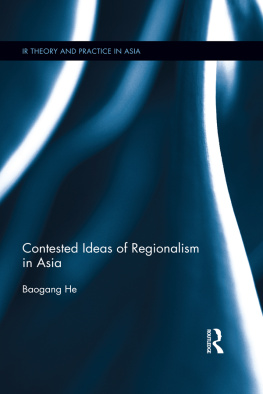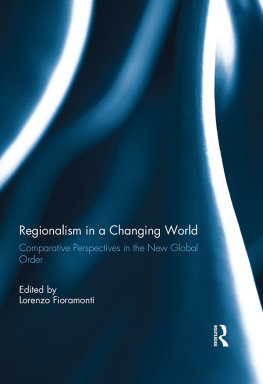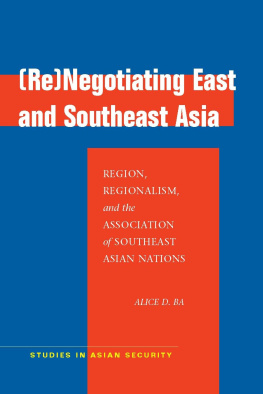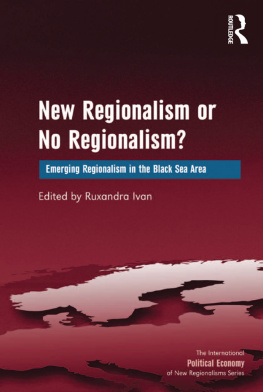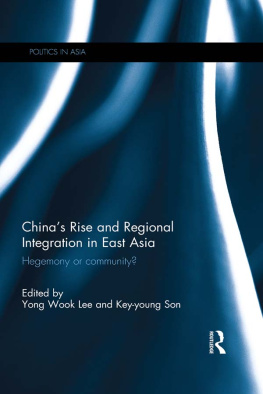
The Global Economic Crisis and East Asian Regionalism
Regional cooperation in East Asia on various issue areas, such as emergency liquidity mechanisms in finance, the exponential growth of free trade agreements and policy coordination on the environment and public health, developed rapidly after the Asian Financial Crisis. A decade later, the global financial crisis offered a new opportunity for the nascent regional cooperation mechanisms to acquire new depth and meaning this time, however, in a very different context due to the unfaltering rise of China. How have inter-state cooperation mechanisms, which were devised originally to deal with the problems of the past crisis, fared in the recent global economic turbulence? Can regional integration effectively insulate East Asia from the vagaries of the international market? Should East Asian nations heed the call for regionalism or globalism?
This volume offers one of the first assessments of how the global economic crisis has affected the prospects for regional integration in East Asia. It also addresses a number of long-standing debates of interest to East Asian specialists, economists and policymakers: Are crises catalysts for revamping developmental models? Do they provide solid foundations for regional solidarity and integration? Can they help catapult countries into the global limelight?
This book was originally published as a special issue of The Pacific Review.
Saori N. Katada is Associate Professor at School of International Relations, University of Southern California. She is the author of Banking on Stability (2001), and has co-edited three books and numerous articles on trade, financial and monetary cooperation in East Asia as well as Japanese foreign aid.
The Global Economic Crisis and East Asian Regionalism
Edited by
Saori N. Katada
First published 2012
by Routledge
2 Park Square, Milton Park, Abingdon, Oxon, OX14 4RN
Simultaneously published in the USA and Canada
by Routledge
711 Third Avenue, New York, NY 10017
Routledge is an imprint of the Taylor & Francis Group, an informa business
2012 Taylor & Francis
This book is a reproduction of The Pacific Review, vol. 24, issue 3. The Publisher requests to those authors who may be citing this book to state, also, the bibliographical details of the special issue on which the book was based.
All rights reserved. No part of this book may be reprinted or reproduced or utilised in any form or by any electronic, mechanical, or other means, now known or hereafter invented, including photocopying and recording, or in any information storage or retrieval system, without permission in writing from the publishers.
Trademark notice: Product or corporate names may be trademarks or registered trademarks, and are used only for identification and explanation without intent to infringe.
British Library Cataloguing in Publication Data
A catalogue record for this book is available from the British Library
ISBN13: 978-0-415-52580-0
Typeset in Times New Roman
by Taylor & Francis Books
Publishers Note
The publisher would like to make readers aware that the chapters in this book may be referred to as articles as they are identical to the articles published in the special issue. The publisher accepts responsibility for any inconsistencies that may have arisen in the course of preparing this volume for print.
Contents
Saori N. Katada
William W. Grimes
Mireya Sols
Yang Jiang
Mark Beeson
Saori N. Katada
Seeking a place for East Asian regionalism: challenges and opportunities under the global financial crisis
Saori N. Katada
Saori N. Katada is Associate Professor at the School of International Relations, and also the Director of the Political Science and International Relations PhD Program (POIR) at the University of Southern California. She is the author of a book Banking on Stability: Japan and the Cross-Pacific Dynamics of International Financial Crisis Management (University of Michigan Press, 2001), which was awarded the Masayoshi Ohira Memorial Book Award in 2002. She also has three co-edited books: Global Governance: Germany and Japan in International System (Ashgate, 2004), Cross Regional Trade Agreements: Understanding Permeated Regionalism in East Asia (Springer, 2008), and Competitive Regionalism: FTA Diffusion in the Pacific Rim (Palgrave Macmillan, 2009).
Abstract After the devastating experience of the Asian financial crisis more than ten years ago, East Asia launched regional economic cooperation efforts. East Asias mixed response to the global financial crisis a decade later, however, reveals how certain impetuses that gave rise to unified efforts to regional institution building in East Asia at the time of the AFC derived, fundamentally, from the regions defensive desire as it positioned itself within the harsh global economic and political environment of that time. The GFC triggered reorganization of global economic governance by discrediting neoliberal principles, introducing a new global governance structure and allowing reliance of domestic stimuli for economic recovery. Those shifts, in turn, led to the loss of East Asias basic mandate towards regional cooperation. In other words, the focus of solving the regions economic vulnerability has now moved from regional arrangement to national and global stages. In particular, the East Asian governments now see less of a need to counterweight the predominant neoliberal voice through unified regional voice as the expansion of the forum to discuss global economic governance to G20 and IMF reform to provide East Asia more representation.
Introduction
After the devastating experience of the Asian financial crisis (AFC), East Asia launched regional economic cooperation efforts about ten years ago. On the financial side, East Asian monetary authorities began their effort to establish a regional emergency funding mechanism that utilized currency swaps to fend off currency at the time of financial crises (Chiang Mai Initiative CMI), which is structured to insulate the regional economy from the impact of financial turmoil like the AFC. Furthermore, in the face of financial globalization, economists and policy makers in the region promoted the importance of regional financial and monetary governance that address the danger of excessive reliance on foreign, particularly short-term, capital and of dollar dependence. On the trade side, despite export dependence on the extra-regional markets continuing into the 2000s, economic reform and trade liberalization imposed by the AFC opened opportunities for regional economies to move from a multilateralism-only (WTO) approach to experimenting, quite aggressively, with preferential trade arrangements (generally known as the Free Trade Agreements, FTA). Most of these FTAs are bilateral, but there has been regional effort towards a free trade area, where ASEAN has been quite successful in managing the FTA boom around it.
As shock waves of the global financial crisis (GFC) reached East Asia in autumn 2008 immediately after the collapse of Lehman Brothers in September, the region faced the task of evaluating and reassessing the economic cooperation efforts of the previous ten years. As discussed in the collection of articles in this special issue, the GFC imposed on these regional economies not only the economic hardship, but also a challenge through which economic reforms and regional cooperation efforts of the last ten years were tested. Most aptly summarized by Beeson in this special issue, the comparison of the AFC and GFC reveals that financial crises can have centrifugal as well as centripetal effects on regionalism in East Asia. While the AFC spun the region into denser cooperation, Beeson notes that the GFC would impose more forces to pull the region apart due to the regions lack of effective mechanisms to coordinate collective responses. How can we understand such a dilemma in East Asias regionalism efforts?





